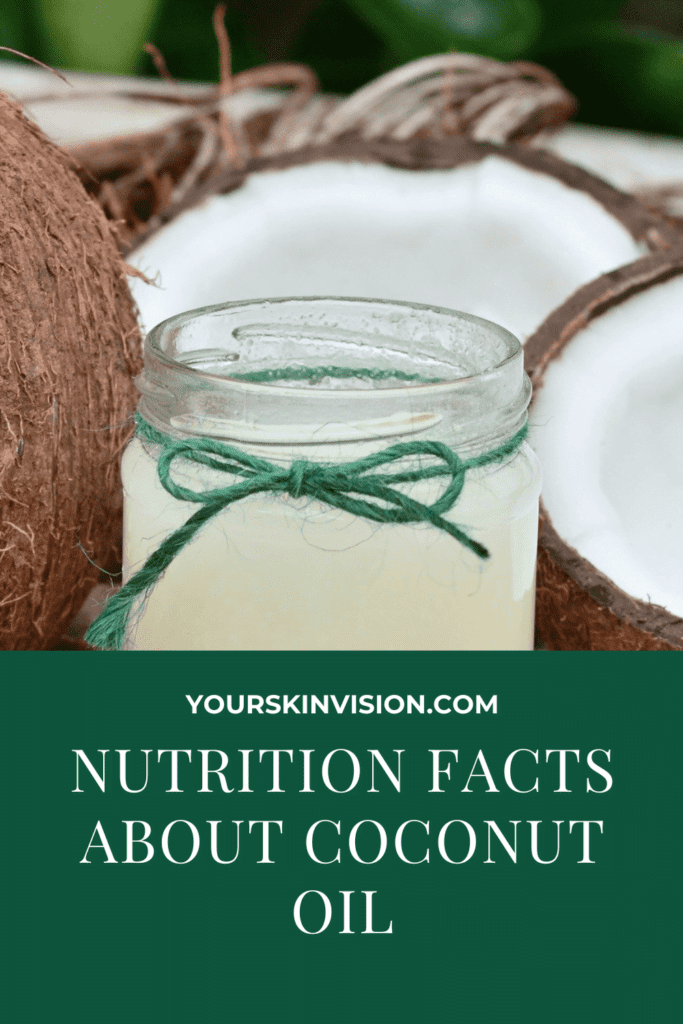Statistics have shown that the global market value of Coconut Oil is worth 4110.8 million US dollars in 2020 and is expected to incline to around 5537.9 million US dollars by 2026.
Coconut trees are much common in countries like India, the Philippines, Malaysia, Indonesia, and Sri Lanka. The oil can be extracted through different processes but generally from the kernel or meat of mature coconuts harvested from the coconut palm.
Different health professionals believe that coconut oil is a major boost to health compared with many other fats.
There are also some major potential benefits of coconut oil to the skin, this includes reducing inflammation, keeping skin moisturized, and helping heal wounds.
But our major aim in writing this content is to enlighten you on some basic nutritional facts about coconut oil. They will be listed below

Table of Contents
Types Of Coconut Oil
There are many different types of coconut oil. Each has its own unique properties and uses.
Virgin Coconut Oil
This is the purest form of coconut oil, with no additives or chemicals added to it. It’s also the most expensive, but it has some of the highest levels of antioxidants and other nutrients.
Extra Virgin Coconut Oil
This type of coconut oil still has all its natural antioxidants, but it may have been refined or distilled to remove impurities from its processing. It also has a higher smoke point than virgin coconut oil, meaning it can be used for cooking at higher temperatures without degrading your food’s flavor or texture.
Refined Coconut Oil
This type of oil has been chemically treated to remove any impurities left after refining. It has a lower smoke point than extra virgin or virgin oils but still retains many of its benefits–particularly when used as a moisturizer in skin care products.
Some Basic Attributes Of Coconut Oil
Coconut oil has a light cream color due to the high percentage of lauric acid. At around 25 °C the specific gravity of coconut oil is 0.917–0.919, and its Iodine value ranges from 7.5–10.5.
In olive oil, it ranges from 74-94, and in sunflower oil from 125- 136. Lastly, its saponification value ranges from 251–263.
Coconut Oil Nutrition Facts
The U.S. Agricultural Department has shown the nutritional value of coconut oil. According to their evaluations, one tablespoon of coconut oil contains
Calories 121
Fats 13.5 grams
Protein 0 grams
Carbohydrate 0 grams
Saturated Fats 11.2 grams
Sugar 0 grams
The Nutritional Analysis in calories shows that 100g of coconut oil has about 884 calories (kcal
Major Coconut Oil Constituents

- Coconut oil is composed of saturated fatty acids of different constituents, it is rich in lauric acid around (49%) followed by myristic acid (8%), palmitic acid (8%), and capric acid, (7%).
- Other common fatty acids found in coconut oil include stearic acid, oleic acid, and linoleic acid.
- Coconut oil contains mostly lauric acid with a long-chain triglyceride, a 12-carbon saturated fat representing the major portion of MCTs.
- Another portion called the medium-chain triglycerides of saturated fats consists of a 6-12 carbon chain.
- One major benefit of medium-chain fatty acids is their ability to digest and absorb more quickly than long-chain fatty acids. They are a more reliable source of energy.
- Generally, oils don’t have protein or carbohydrates.
- Olive, coconut, and vegetable oils each give the same number of calories per tablespoon.
Some Health Nutritional Benefits Of Coconut Oil
- Coconut oil can replace a higher level of unsaturated fats to reduce the risk factors of having cardiovascular disease
- Coconut oil is an easier-to-use source of energy, it also serves as fuel to keep brain cells active. Also, it is found very useful in improving the body’s use of insulin.
- Research has shown that coconut oil raises the HDL cholesterol of the body, which doctors call good cholesterol for the body.
- coconut oil with antioxidant properties can help reduce stress caused by exercise and other conditions.
- Additionally, coconut oil is widely found applicable in traditional medicines and as a carrier oil in pharmaceuticals.
- It is found very useful for losing weight. but note that adding more high-fat, calorie-dense foods to a diet that contains carbohydrates and plenty of calories may not result in weight. loss.
- Coconut oil contains a very high percentage of fats that increase the high-density lipoprotein while reducing the low-density lipoprotein level of the body.
- It also contains the highest levels of saturated fats, which makes it preferable for cooking vegetables.
- The antioxidants present in coconut oil also help in treating inflammation, it is also found very effective for arthritis
- Coconut oil has medium-chain triglycerides which can convert fat to energy. This can help reduce abdominal fats
- The ketones present in coconut oil are a proven source of energy for treating Alzheimer’s disease
Coconut Oil Benefits On The Skin
The following are some usefulness of coconut oil on the skin
- Also, coconut oil is useful for skin health, applying coconut oil to the human skin helps in massive protection against environmental damages
- Some dermatologists also reveal that coconut oil as a moisturizer is preferable to using mineral oil when combating dry skin.
- Coconut oil can also be used to heal your skin and prevent it from scarring. It provides antioxidants, moisturizes, minimizes the signs of aging, boosts nutrients, and helps to protect the skin.
- Coconut oil can also protect against hair damage. Research has shown that coconut oil acts as a sunscreen protecting the skin against the sun’s ultraviolet (UV) rays.
- With the help of lauric acid and monolaurin, coconut oil can act with antimicrobial effects on pathogens, such as bacteria, viruses, and fungi.
what Are The Dangers Of Consuming Too Much Coconut Oil
Coconut oil is a great way to get the benefits of healthy fats without having to eat a lot of it. But if you are consuming too much, there are some dangers.
First off, too much coconut oil could cause weight gain. The reason for this is that when you consume more fat than your body needs for energy, it will be stored as fat instead of burned off as energy. This can lead to obesity which can increase your risk for heart disease and diabetes.
Secondly, too much coconut oil can cause high cholesterol levels in your bloodstream which can lead to heart disease and stroke. When cholesterol builds up in your arteries it causes them to become stiffer and less flexible which makes it harder for blood to flow through them which increases the risk of developing cardiovascular disease.
Thirdly, consuming too much coconut oil may cause digestive problems such as diarrhea or constipation because of its high fiber content which may irritate your intestinal lining causing irritation or inflammation and leading to colon cancer if left untreated over time.
Some Common Questions About Coconut Oil
1) Is coconut oil good for pregnant women
Yes, it is. Coconut oil has some antifungal and anti-bacterial. This property helps in preventing colds and some viruses in pregnant women.
Some dermatologist states that coconut oil can be used as a home remedy for treating stretch marks and itchy skin in pregnant women.
2) Is Coconut oil good for oily skin
No, it is not good for oily skin. Coconut oil is highly comedogenic, it can clog skin pores.
3) Can coconut oil clear dark spots
Coconut oil can be used at home to reduce the presence of fine lines and dark spots.
4) Is coconut oil good for dry skin
Yes, it is. Coconut oil is infused with some key hydrating ingredients to help soften your skin. It can be the best alternative to your regular moisturizer for trapping moisture inside and keeping skin supple and hydrated.
Conclusion
Coconut oil is a nutritional powerhouse that has maintained its popularity for thousands of years. If you are interested in discovering more about it, we encourage you to continue further down this rabbit hole.
If you are simply looking for a healthy coconut oil recipe, remember to check out this post on the topic. Either way, we hope you found plenty here to pique your interest.
